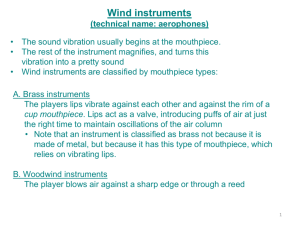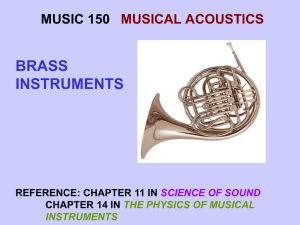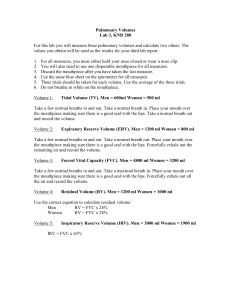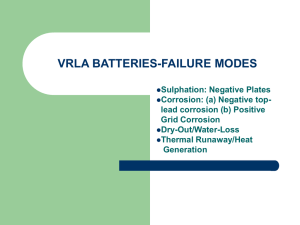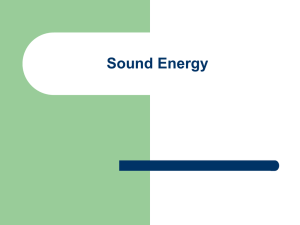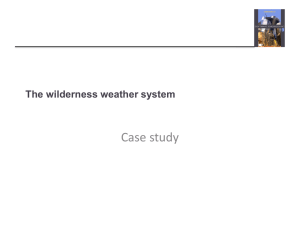lecture20
advertisement
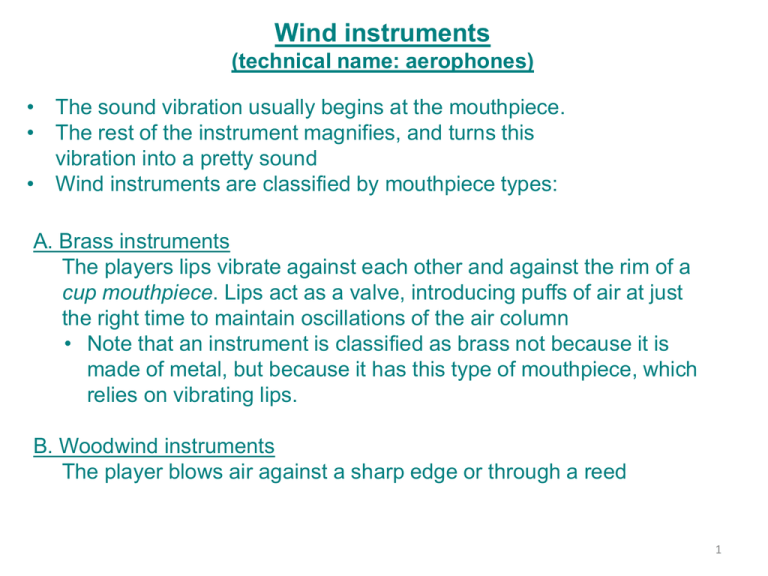
Wind instruments (technical name: aerophones) • The sound vibration usually begins at the mouthpiece. • The rest of the instrument magnifies, and turns this vibration into a pretty sound • Wind instruments are classified by mouthpiece types: A. Brass instruments The players lips vibrate against each other and against the rim of a cup mouthpiece. Lips act as a valve, introducing puffs of air at just the right time to maintain oscillations of the air column • Note that an instrument is classified as brass not because it is made of metal, but because it has this type of mouthpiece, which relies on vibrating lips. B. Woodwind instruments The player blows air against a sharp edge or through a reed 1 A. Brass Instruments Construction: •Mouthpiece •Mouthpipe •Cylindrical section (with valves) •Bell 2 Oscillations in a pipe (review) v fn n 4L n 1,3,5,7... Trumpet: L 140cm 1.4m v 343m / s fn n n 61.3Hzn 61, 184, 306, 429 Hz 4L 4 1.4m . 3 Acoustic impedance Definitions: Specific acoustic impedance: Acoustic impedance: p z u p p z Z U uS S p2 I z 2 I u Volume velocity: U uS p – sound pressure u – speed of particles of media (air) S – cross-sectional area of the tube I – intensity For plane wave: z v ρ – density v – speed of sound For air: v 400kg /(m 2 s) 4 Acoustic Impedance curve •Acoustic impedance is a function of frequency •Acoustic impedance curves have peaks at resonance frequencies Role of acoustic impedance in brass instruments At the frequencies of impedance peaks the excess pressure helps to open the lips (pressure cooperates with the lips) – regenerative or positive feedback 5 ( 1 2 ) Bernoulli’s equation y A2 v2 W K U d2 W F1d1 F2 d 2 P1 A1d1 P2 A2 d 2 P1 P2 V A1 v1 d1 K 12 mv22 12 mv12 12 V (v22 v12 ) U mg( y2 y1 ) Vg ( y2 y1 ) P1 P2 12 (v22 v12 ) g ( y2 y1 ) P1 gh1 12 v12 P2 gh2 12 v22 P gh 12 v2 const 6 The bell All brass instrument have bells • Bell changes spectrum of the radiated sound • Bell changes acoustic impedance curve (both the frequencies and heights of the resonance peaks) • Bell changes the radiation pattern, making it more directional at high frequencies (Why at high frequencies?) • It allows more efficient radiation of sound by matching the high pressure inside the horn with the lower pressure outside The mouthpiece It shifts the frequencies of the impedance peaks, but has more dramatic effect on peak heights, especially enhancing low resonances. Popping frequency – the lowest resonance of a brass instrument mouthpiece (750-850 Hz) Question: Estimate the length of the mouthpiece. f1 v 1 v 4L v 340m / s L 10cm 4 f1 4 800Hz 7 Valves Valves are more commonly found on brass instruments. Pressing a valve makes the air flow through an extra section of tube, temporarily making the instrument longer in between the mouthpiece and the bell. The slightly longer instrument gets a slightly lower fundamental harmonic, and a lower harmonic series. (A few valves are ascending valves, which cut off a section of tubing and so raise the pitch.) animation http://cnx.org/content/m12364/latest/trumpetvalve.swf Slides (trombone) Seven positions of the slide are needed to play all desired notes of the scale These positions are not equally spaced (for a semitone down ~6% elongation) Problems with valves position and slides length L1 2 21 12 1 0.0595 L1 21 6 1 0.1225 L3 2 21 4 1 0.1892 L1 2 L1 0.1819 8 Woodwind instruments The player blows air against a sharp edge or through a reed Reed • A thin strip which vibrates to produce a sound • Usually made from “Giant cane” (bamboo), sometimes from synthetic materials • Single reeds instruments: clarinet, saxophone • Double reed instruments: oboe, english horn, bassoon, contrabassoon • Free reeds: a) framed free reads - accordion, harmonica, bayan, ancient instruments; b) unframed free reads – some primitive instruments 9
